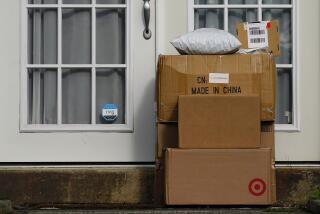Hotel’s Liability in Theft Cases Is Very Limited
Anticipating deadline pressure, a sportswriter in Boston for a Celtics game last year set up his travel-size computer on the desk, laid out everything he needed to write his story fast and left his expensive downtown hotel. When he returned from the game two hours later, the computer was gone, “along with my Knirps collapsible umbrella.”
The hotel’s response? “They were courteous,” he says, “and didn’t accuse me of lying.” But that was it: To his surprise, they didn’t offer to make good the loss.
Apparently only travelers are surprised; the writer’s employer, a suburban daily, simply sent him another computer. “You assume,” says one frequent traveler, “that hotels are in some way responsible, because they should make the building secure, and that they’re insured for such losses.”
Actually, a hotel or motel assumes no such automatic liability for theft. Under state laws as much as a hundred years old, the liability of “innkeepers” is limited in both the amount they could be asked to pay and the circumstances under which they’d have to pay it.
Instead, a traveler’s loss is usually covered by his homeowner’s insurance--the part dealing with theft or loss away from home--or his employer. Even the hotel’s participation in the whole affair may be limited--”helping them replace a piece of equipment or clothing,” says Jim Moyer, vice president of loss prevention for Marriott hotels and resorts, “or helping them fill out a police report.” Marriott, like others, will also conduct an in-house investigation--not because it’s mandatory but because it’s good business.
The only question is “did the hotel provide reasonable care,” says Wendell Couch, director of loss prevention for Holiday Corp., owner of Holiday Inns. This usually means door locks, hotel safes for valuables (and notice of their availability) and adequate “key control”--”knowing who has all the (available) keys at any time,” says Couch. At many hotels, it may mean in-room safes and even card keys and electronic locks “that allow us,” says Couch, “to re-key the lock after each guest.”
They’re only responsible if negligent, providing no locks perhaps, or broken locks on outside or connecting doors. They may also be found responsible, says Wayne Brown, vice president of claims at Safeco Insurance, a hotel liability carrier, “if they’d been put on notice that there were multiple thefts, because of easily opened windows, for example, and had done nothing about it.”
But “it’s very difficult to establish negligence,” adds Brown, “if the hotel is reasonably well run.” The guest--or his home insurer--even has to prove that there was a loss, that the allegedly stolen item actually existed, had been in the room and now was gone.
Furthermore, it may be the guest who didn’t exercise “reasonable care.” People leave keys on their towel when they go swimming and room doors ajar while visiting nearby rooms. Many ignore hotel safes; the most common thefts are jewelry and cash.
There may also be some third-party intervention, through no fault of the hotel. It may be an obvious break-in--”someone who took a pipe wrench,” says Couch, “and twisted off a lock.” There are also more subtle thieves--professionals who may follow conventions, says Moyer. Some simply try all doors on a hall until they find one open (if someone’s there, they just apologize); others note which guests have signed into the swimming pool and head for the desk, saying, “I’m Joe Jones, please give me my key.”
In such a case, the question of responsibility isn’t just a legal nicety. “My feeling is that people need to understand there’s no total security anywhere, and they must be asked to bear some degree of responsibility themselves,” says Richard Elbrecht, head of legal services for California’s Department of Consumer Affairs. “The world can’t function by making somebody else assume responsibility for all losses.”
More to Read
Sign up for The Wild
We’ll help you find the best places to hike, bike and run, as well as the perfect silent spots for meditation and yoga.
You may occasionally receive promotional content from the Los Angeles Times.






